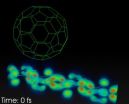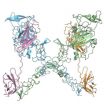(Press-News.org) CHICAGO, IL (May 30, 2014)—The use of chemotherapy before surgery to remove ovarian cancer has increased dramatically in recent decades, particularly among certain patients, according to a new analysis from Fox Chase Cancer Center that will be presented at the 50th Annual Meeting of the American Society of Clinical Oncology.
Looking back at medical records from more than 58,000 women, Fox Chase's Angela Jain, MD, Medical Oncologist and co-investigator Elizabeth Handorf, PhD, member of the Biostatistics and Bioinformatics Facility, found that only 8.94% received chemotherapy before ovarian cancer surgery in 1998; by 2011, that figure had increased to 26.72%.
The standard of care, Dr. Jain explained, is to offer chemotherapy after surgery, not before – but in some cases, patients are not well enough to have surgery right away. "They may have other health problems, such as heart failure or severe lung disease, which complicate the procedure," she said. Their cancer may also be so far advanced that they need an additional treatment step.
Indeed, Drs. Jain and Handorf found that patients were more likely to receive so-called "neoadjuvant" chemotherapy if they were older than 70, and had additional illnesses.
Having government-run health insurance – Medicaid or Medicare – also increased a woman's odds of undergoing chemotherapy before surgery. In contrast, race and location did not appear to influence her likelihood of receiving neoadjuvant therapy.
Not surprisingly, patients who did not receive chemotherapy before surgery tended to live longer following surgery to remove their tumor – half were alive 41 months later, while median survival for those who had neoadjuvant chemotherapy was closer to 31 months. This is not an indication that neoadjuvant chemotherapy is not effective, Dr. Jain cautioned, since the women who received it were older and sicker to begin with. But additional analyses showed that patients with stage 4 disease who received neoadjuvant chemotherapy tended to have fewer complications after surgery and survive just as long as other stage 4 women. However, those with stage 3 disease tended to survive longer if they skipped neoadjuvant therapy.
Indeed, the current study cannot determine whether neoadjuvant chemotherapy was beneficial, said Dr. Jain, because it does not compare groups of similar women who were randomly chosen to receive the treatment or not. "This is good information," said Dr. Jain. "Women with stage 4 disease maybe can have chemotherapy before surgery, and their survival isn't limited. But we need to study this population in more depth before we can conclude whether there are some groups of women who should or should not be receiving neoadjuvant chemotherapy."
In the meantime, women with ovarian, fallopian, and primary peritoneal cancers who want to learn more about neoadjuvant chemotherapy should consult their physicians, said Dr. Jain. "Patients with these cancers need to talk to their oncologists about their treatment plan, and what is right for them. Each person is an individual, so their care has to be catered to them."
Just why the rate of neoadjuvant chemotherapy has increased so dramatically in ovarian cancer is "hard to know," she noted, because there are no set criteria for prescribing it. "It's a judgment call of the oncologist to decide if a patient is healthy enough to have surgery or not, and whether the gynecologic oncologist feels that they can remove all of the tumor during surgery" she said. "What we do know, is that patients in general are aging, and older patients are more likely to both have additional illnesses and receive neoadjuvant chemotherapy. So it's possible this factor may help explain why more women are receiving neoadjuvant chemotherapy."
To assess this trend, Drs. Jain and Handorf reviewed the records of 58,048 women with advanced stage ovarian cancer diagnosed between 1998 and 2011 using the National Cancer Database.
INFORMATION:
Fox Chase Cancer Center, part of the Temple University Health System, is one of the leading cancer research and treatment centers in the United States. Founded in 1904 in Philadelphia as one of the nation's first cancer hospitals, Fox Chase was also among the first institutions to be designated a National Cancer Institute Comprehensive Cancer Center in 1974. Fox Chase researchers have won the highest awards in their fields, including two Nobel Prizes. Fox Chase physicians are also routinely recognized in national rankings, and the Center's nursing program has received the Magnet status for excellence four consecutive times. Today, Fox Chase conducts a broad array of nationally competitive basic, translational, and clinical research, with special programs in cancer prevention, detection, survivorship, and community outreach. For more information, visit Fox Chase's Web site at http://www.foxchase.org or call 1-888-FOX CHASE or (1-888-369-2427). END
More patients with ovarian cancer are receiving chemotherapy before surgery
2014-05-30
ELSE PRESS RELEASES FROM THIS DATE:
Compounds in saliva and common body proteins may fend off DNA-damaging chemicals
2014-05-30
A compound in saliva, along with common proteins in blood and muscle, may protect human cells from powerful toxins in tea, coffee and liquid smoke flavoring, according to results of a new study led by investigators at the Johns Hopkins Kimmel Cancer Center.
The findings, reported online May 19 in Food and Chemical Toxicology, suggest that people naturally launch multiple defenses against plant chemicals called pyrogallol-like polyphenols or PLPs found in teas, coffees and liquid smoke flavoring. The presence of these defenses could help explain why PLPs are not crippling ...
New satellite animation shows the end of Hurricane Amanda
2014-05-30
VIDEO:
This animation of visible and infrared imagery from NOAA's GOES-West satellite shows the weakening of Hurricane Amanda from May 28 to its dissipation on May 30.
Click here for more information.
A new animation of visible and infrared imagery from NOAA's GOES-West satellite shows the weakening and dissipation of the Eastern Pacific Ocean's Hurricane Amanda. The animation that runs from from May 28 to May 30 was created at NASA/NOAA's GOES Project at NASA's Goddard Space ...
Hepatitis C reactivation doesn't worsen survival for HIV+ patients diagnosed with lymphoma
2014-05-30
CHICAGO, IL (May 30, 2014)—More than a quarter of HIV+ patients are also infected with the Hepatitis C virus (HCV), which may complicate treatment and care decisions after a cancer diagnosis. The specifics of those complications haven't been well-researched in the past. Results from a new Fox Chase Cancer Center study on this patient population may start filling in that gap.
Fox Chase Hematologist and Medical Oncologist Stefan K. Barta, MD, MS, MRCP – who led the study – analyzed data from HIV+ patients diagnosed with lymphoma, collected over 17 years, to better understand ...
Identification of central nervous system involvement for patients with AIDS-related lymphomas
2014-05-30
CHICAGO, IL (May 30, 2014)—Patients with AIDS-related lymphomas (ARL) may face an increased risk of central nervous system involvement (CNSi) compared to other lymphomas. The effect of CNSi on survival outcomes, however, hasn't been thoroughly examined until now.
In a new study led by Fox Chase Cancer Center Hematologist and Oncologist Stefan K. Barta, MD, MS, MRCP, researchers report that CNSi – identified at the time of an ARL diagnosis – does not appear to have an impact on overall survival. Dr. Barta's collaborators will present the findings at the 50th Annual Meeting ...
Moffitt Cancer Center instrumental in new clinical guidelines for cancer-related fatigue
2014-05-30
TAMPA, Fla. (May 30, 2014) – Fatigue is a debilitating problem for cancer patients undergoing treatment; however, it also poses a huge detriment after treatment and can significantly affect quality of life. Approximately 30 percent of cancer patients endure persistent fatigue for several years after treatment, according to an American Society of Clinical Oncology Expert Panel co-chaired by Paul Jacobsen, Ph.D., associate center director of Population Sciences at Moffitt Cancer Center.
ASCO created the panel to develop assessment, screening, and treatment guidelines for ...
First real time movies of the light-to-current conversion in an organic solar cell
2014-05-30
VIDEO:
Real time quantum simulation of the conversion of light into current in an organic solar cell composed of a polymer chain, and a Fullerene buckyball. The movie lasts for about...
Click here for more information.
Photovoltaic cells directly convert sun light into electricity and hence are key technological devices to meet one of the challenges that mankind has to face in this century: a sustainable and clean production of renewable energy. Organic solar cells, using polymeric ...
Research details how developing neurons sense a chemical cue
2014-05-30
Symmetry is an inherent part of development. As an embryo, an organism's brain and spinal cord, like the rest of its body, organize themselves into left and right halves as they grow. But a certain set of nerve cells do something unusual: they cross from one side to the other. New research in mice delves into the details of the molecular interactions that help guide these neurons toward this anatomical boundary.
In an embryo, a neuron's branches, or axons, have special structures on their tips that sense chemical cues telling them where to grow. The new findings, by ...
Study highlights side effects felt by BRCA mutation carriers after cancer risk-reducing procedure
2014-05-30
PHILADELPHIA — The majority of women with cancer causing BRCA1 and BRCA2 mutations experience sexual dysfunction, menopausal symptoms, cognitive and stress issues, and poor sleep following prophylactic removal of their Fallopian tubes and ovaries - a procedure known as risk-reducing salpingo-oophorectomy (RRSO) - according to results of a new study from the Abramson Cancer Center and the Perelman School of Medicine at the University of Pennsylvania. The team's findings, which reaffirm the need for a better understanding of how to manage long-term effects of the risk-reducing ...
Can narcissists be moved to show empathy?
2014-05-30
Researchers at the University of Surrey and the University of Southampton have investigated whether narcissists can elicit empathy for another person's suffering. It has been well documented that narcissists lack empathy, but why is that the case, and do they have the capacity to change that behavior? The research is published in Personality and Social Psychology Bulletin.
Characterizing narcissism
When we think of narcissism most of us can all think of a colleague, friend, or former significant other that would fit the description; "A bit full of themselves, self-centered, ...
Narcissists can feel empathy, research finds
2014-05-30
Narcissists tend to lack empathy, which can cause problems for themselves, the people around them and society in general. However, new research published today from the University of Surrey, suggests that with the right focus, people with narcissistic tendencies can feel empathy for another person's suffering. This may be important in helping to prevent the often violent or anti-social behaviours that some narcissists are prone to and the crimes that are committed as a result.
The research, published in Personality and Social Psychology Bulletin, studied participants ...


